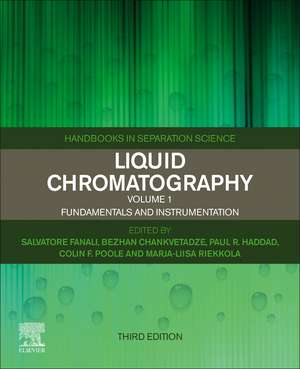Liquid Chromatography: Fundamentals and Instrumentation: Handbooks in Separation Science
Editat de Salvatore Fanali, Bezhan Chankvetadze, Paul R. Haddad, Colin Poole, Marja-Liisa Riekkolaen Limba Engleză Paperback – 20 apr 2023
- Emphasizes the integration of chromatographic methods and sample preparation
- Provides important data related to complex matrices, sample preparation, and data handling
- Gives background information to facilitate the choice of LC sub-technique and experimental conditions, mobile and stationary phases, detectors, data processing, and more
- Offers comprehensive updates to all chapters
- Includes new chapters on chiral recognition, co-solvents and mobile phase additives, physicochemical measurements, and identification and quantitation in mass spectrometry
| Toate formatele și edițiile | Preț | Express |
|---|---|---|
| Paperback (2) | 918.05 lei 36-50 zile | |
| ELSEVIER SCIENCE – 20 apr 2023 | 918.05 lei 36-50 zile | |
| ELSEVIER SCIENCE – 19 apr 2023 | 924.34 lei 36-50 zile |
Preț: 918.05 lei
Preț vechi: 1191.29 lei
-23% Nou
Puncte Express: 1377
Preț estimativ în valută:
175.67€ • 183.88$ • 146.21£
175.67€ • 183.88$ • 146.21£
Carte tipărită la comandă
Livrare economică 24 martie-07 aprilie
Preluare comenzi: 021 569.72.76
Specificații
ISBN-13: 9780323999687
ISBN-10: 0323999689
Pagini: 884
Ilustrații: 245 illustrations (50 in full color)
Dimensiuni: 191 x 235 x 47 mm
Greutate: 1.49 kg
Ediția:3
Editura: ELSEVIER SCIENCE
Seria Handbooks in Separation Science
ISBN-10: 0323999689
Pagini: 884
Ilustrații: 245 illustrations (50 in full color)
Dimensiuni: 191 x 235 x 47 mm
Greutate: 1.49 kg
Ediția:3
Editura: ELSEVIER SCIENCE
Seria Handbooks in Separation Science
Public țintă
Scientists working in academia/research institutes; teachers and university students from B.Sc. level to PhD level; industry professionals in R&D and quality control managersCuprins
1. Milestones in the development of liquid chromatography
2. Kinetic theories of liquid chromatography
3. Column technology in liquid chromatography
4. General instrumentation in HPLC
5. Liquid-solid chromatography
6. Reversed-phase liquid chromatography
7. Secondary chemical equilibria in reversed-phase liquid chromatography
8. Ultra-high performance and Ultrafast liquid chromatography
9. Nano-liquid chromatography
10. Hydrophilic interaction liquid chromatography
11. Mobile phase selection in liquid chromatography
12. Co-solvents and mobile phase additives (new chapter)
13. Method development in liquid chromatography
14. Physicochemical measurements
15. Theory and practice of gradient elution liquid chromatography
16. Fundamentals of Enantioselective LC (Chiral recognition mechanisms)
17. Hydrophobic interaction chromatography
18. Ion chromatography
19. Size-exclusion chromatography
20. Interaction polymer chromatography
21. Affinity chromatography
22. Multidimensional Liquid Chromatography
23. Process concepts in preparative chromatography
24. Modeling of preparative liquid chromatography
25. Capillary electrochromatography
26. Liquid Chromatography on microchip
27. Mass spectrometric detection, instrumentation and ionization methods
28. Identification and quantitation in Mass Spectrometry
29. Advanced IR and Raman detectors for identification and quantification
30. Advanced spectroscopic detectors for identification and quantification: Nuclear magnetic resonance
31. Prediction of retention in Liquid Chromatography
32. Validation of liquid chromatographic methods – chemometrics and calibration
2. Kinetic theories of liquid chromatography
3. Column technology in liquid chromatography
4. General instrumentation in HPLC
5. Liquid-solid chromatography
6. Reversed-phase liquid chromatography
7. Secondary chemical equilibria in reversed-phase liquid chromatography
8. Ultra-high performance and Ultrafast liquid chromatography
9. Nano-liquid chromatography
10. Hydrophilic interaction liquid chromatography
11. Mobile phase selection in liquid chromatography
12. Co-solvents and mobile phase additives (new chapter)
13. Method development in liquid chromatography
14. Physicochemical measurements
15. Theory and practice of gradient elution liquid chromatography
16. Fundamentals of Enantioselective LC (Chiral recognition mechanisms)
17. Hydrophobic interaction chromatography
18. Ion chromatography
19. Size-exclusion chromatography
20. Interaction polymer chromatography
21. Affinity chromatography
22. Multidimensional Liquid Chromatography
23. Process concepts in preparative chromatography
24. Modeling of preparative liquid chromatography
25. Capillary electrochromatography
26. Liquid Chromatography on microchip
27. Mass spectrometric detection, instrumentation and ionization methods
28. Identification and quantitation in Mass Spectrometry
29. Advanced IR and Raman detectors for identification and quantification
30. Advanced spectroscopic detectors for identification and quantification: Nuclear magnetic resonance
31. Prediction of retention in Liquid Chromatography
32. Validation of liquid chromatographic methods – chemometrics and calibration
Recenzii
"...the well-structured layout makes it easy for the reader to find the desired information. The written language is clear, the many abbreviations are introduced, and almost all chapters are easy to read…
And even though the here-presented volumes cover such a wide range of material, it did not lower the quality or in-depth level of the provided information that one might only expect from a book with a narrower focus...
The LC series of the Handbooks in Separation Science lay a great foundation for research purposes and should be declared an essential resource for students aiming to work with liquid chromatographic techniques. Having all the information organized in one spot is additionally useful for researchers already active in the field." --Claudia Zielke, Springer
And even though the here-presented volumes cover such a wide range of material, it did not lower the quality or in-depth level of the provided information that one might only expect from a book with a narrower focus...
The LC series of the Handbooks in Separation Science lay a great foundation for research purposes and should be declared an essential resource for students aiming to work with liquid chromatographic techniques. Having all the information organized in one spot is additionally useful for researchers already active in the field." --Claudia Zielke, Springer














